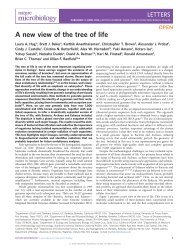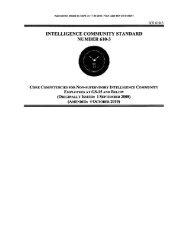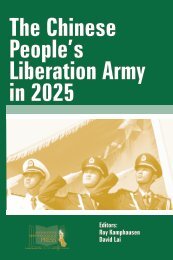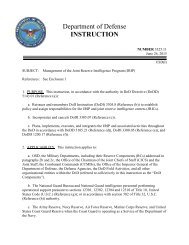The Joint Force in a Contested and Disordered World
JCS-JOE-2035
JCS-JOE-2035
Create successful ePaper yourself
Turn your PDF publications into a flip-book with our unique Google optimized e-Paper software.
follow<strong>in</strong>g the collapse of the Soviet Union, a grow<strong>in</strong>g economy, a system of alliances coupled with<br />
a formidable global bas<strong>in</strong>g network, <strong>and</strong> the very visible display of U.S. military power <strong>in</strong> the first<br />
Gulf War <strong>in</strong>duced a significant amount of caution <strong>in</strong> competitors wish<strong>in</strong>g to challenge the United<br />
States, its allies, partners, <strong>in</strong>terests, <strong>and</strong> overall global position.<br />
Over the next two decades, the United States will likely ma<strong>in</strong>ta<strong>in</strong> its position as the s<strong>in</strong>gle most<br />
powerful actor on the world stage. However, while no power or coalition of powers has yet<br />
emerged to openly oppose U.S. global <strong>in</strong>fluence <strong>and</strong> reach, the United States will operate <strong>in</strong> a<br />
world <strong>in</strong> which its overall economic <strong>and</strong> military power, <strong>and</strong> that of its allies <strong>and</strong> partners, may not<br />
grow as quickly as potential competitors. <strong>The</strong> rise of economic near-peer competitors outside of<br />
the U.S. alliance system is critically important because “economic might is the foundation of<br />
military power…<strong>and</strong> a reliable way to ga<strong>in</strong> a military advantage over rivals.” 22<br />
As some states fully emerge as lead<strong>in</strong>g actors <strong>in</strong> the globalized economy, they are likely to ga<strong>in</strong> a<br />
new sense of power <strong>and</strong> confidence with each scientific, economic, <strong>and</strong> social achievement.<br />
Inevitably, this success will encourage them to advocate their own ideas about how economic <strong>and</strong><br />
strategic relations with other states should be governed. <strong>The</strong> United States will encounter powerful<br />
states reach<strong>in</strong>g for regional supremacy, rearrang<strong>in</strong>g borders, <strong>and</strong> construct<strong>in</strong>g new economic <strong>and</strong><br />
political arrangements. <strong>The</strong>y will attempt to h<strong>in</strong>der the ability of the United States <strong>and</strong> its allies to<br />
work together <strong>and</strong> actively try to isolate key alliance members. Further, they might encourage or<br />
coerce them to leave the alliance structure altogether.<br />
Nature of Potential Adversaries<br />
For the foreseeable future, the ris<strong>in</strong>g economic <strong>and</strong> cultural power of some Asian countries,<br />
particularly Ch<strong>in</strong>a, is breed<strong>in</strong>g new <strong>and</strong> more expansive political <strong>and</strong> geostrategic ambitions<br />
backed by grow<strong>in</strong>g military power. In other areas, the historical logic of imperialism, sometimes<br />
accelerated by economic <strong>and</strong> demographic decl<strong>in</strong>e, is lead<strong>in</strong>g to reactive aggression designed to<br />
blunt or erode U.S. <strong>in</strong>fluence regionally. Examples <strong>in</strong>clude Russia’s renewed political/military<br />
aggression <strong>in</strong> Europe, the Caucuses, <strong>and</strong> Central Asia; Iran’s cultural/religious bid for hegemony<br />
<strong>in</strong> the Middle East; <strong>and</strong> North Korea’s ongo<strong>in</strong>g efforts to detach U.S. political <strong>and</strong> military support<br />
to the Republic of Korea.<br />
Revisionist states will be <strong>in</strong>creas<strong>in</strong>gly dissatisfied with the current Western-derived notion of<br />
<strong>in</strong>ternational order. For example, Vladimir Put<strong>in</strong> noted that <strong>in</strong> the Russian view, uncontested<br />
Western leadership means an <strong>in</strong>ternational environment <strong>in</strong> which “no one feel(s) safe, because no<br />
one can feel that <strong>in</strong>ternational law is like a stone wall that can protect them.” 23 In these cases, states<br />
may use military power to establish (or reestablish) local spheres of <strong>in</strong>fluence, create buffer states<br />
or regions which are subord<strong>in</strong>ate <strong>and</strong>/or dependent on the local hegemon, <strong>and</strong> disconnect<br />
neighbor<strong>in</strong>g states from the broader global economic <strong>and</strong> political system.<br />
Major state competitors will try to weaken traditional U.S. alliances or take advantage of perceived<br />
fractures to exp<strong>and</strong> their regional power. Although seem<strong>in</strong>gly <strong>in</strong>significant today, organizations<br />
such as the Shanghai Cooperation Organization <strong>and</strong> the Eurasian Economic Union could grow as<br />
22<br />
John Mearsheimer, <strong>The</strong> Tragedy of Great Power Politics (2014) p. 142.<br />
23<br />
Vladimir Put<strong>in</strong>, as quoted <strong>in</strong> Robert Kagan, “<strong>The</strong> End of the End of History: Why the 21st Century will look like<br />
the N<strong>in</strong>eteenth,” <strong>The</strong> New Republic, (April 23 2008).<br />
28











